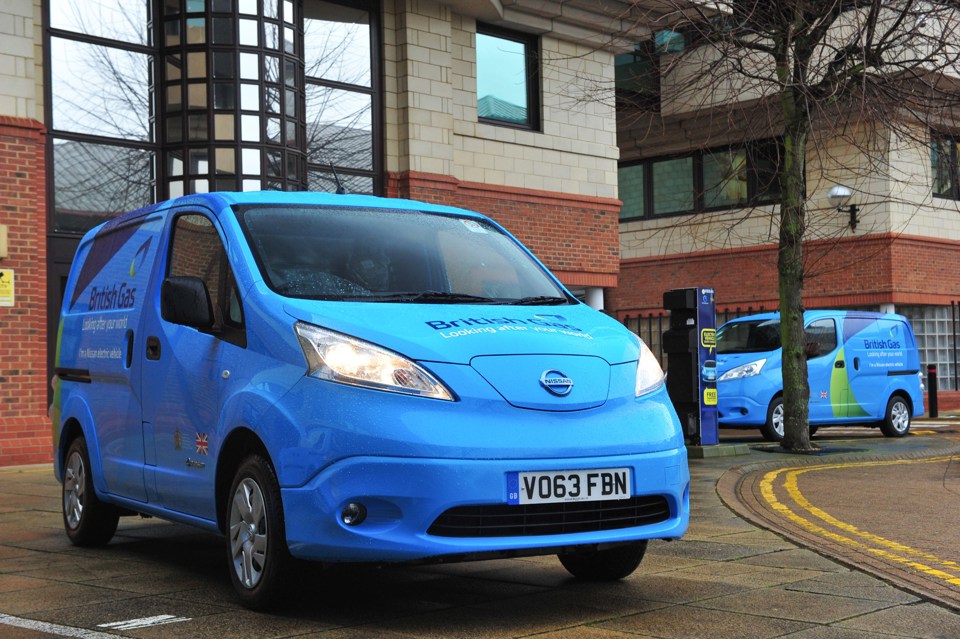British Gas has missed its target to have 10% of its commercial fleet as electric vehicles (EVs) this year and is pushing back the target to 2020.
The UK energy provider trialled 28 Nissan e-NV200s in 2013 and then went on to order an additional 100 on a five-year contract in 2014. At the time, the plan was to expand the electric van fleet to around 1,300 vehicles out of its 13,000 commercial vehicles. However, it currently has just 113 on fleet.
A British Gas spokesman told Fleet News: “We are committed to actively pushing alternative-fuelled vehicles and will endeavour to find the most economical and ecological solution.
“Unfortunately, the technology to underpin this has not developed as quickly as we need it to, as our priority must be providing the service that our customers expect and need in a home or heating emergency.”
British Gas said the charging infrastructure in London was a particular issue and is “not yet of the right standard or widely available enough”.
The spokesman added: “The British Gas fleet needs total reliability as our customers depend on us getting to them at any time of the day or night, so we need an infrastructure that will always support that. The infrastructure for electric vehicles is not there yet.
“These external factors have contributed to us resetting the date for 10% of our fleet to be electric to 2020. Before this period we hope to see the marketplace pick up with electric vans.”
British Gas refused to comment when asked if the e-NV200s would be replaced with diesel equivalents when the vehicles reached the end of their contract. At the time of taking on the additional 100 EVs, British Gas said they did represent a cost saving versus diesel as long as they covered more than 10,000 miles a year.
In London the cost savings could be as high as 20%, with other locations representing about a 6-10% saving over a diesel equivalent.
All British Gas e-NV200s are charged at engineers’ homes as the company does not have depots.
As of October 2016, around 2,500 plug-in van grants have been claimed since the scheme began in 2012, according to Government figures. This compares with 10,264 pure EV cars sold in 2016 or 26,9750 alternative fuel cars last year.
Karl Anders, Nissan GB national EV manager for corporate sales, preferred not to comment on British Gas’s 10% target. However, he did say the rate of adoption for the electric van market is running behind cars due to the fact there are fewer manufacturers offering models and larger vans are not currently cost effective.
He said: “The larger you go with an electric van, the larger the battery you need and the benefits in wholelife costs versus a diesel equivalent become more difficult.”
Anders wants to see more focus from the Government to help support electric vans, perhaps adjusting the structure of the plug-in van grant.
He said: “The Government does need to push things further and put more weight behind the electric van market. A flat rate for the plug-in van grant, like cars, rather than the current situation for 20% of the cost of a van, up to a maximum of £8,000 would also help.”
Renault is introducing the Kangoo ZE+ with increased battery range from 106 to 168 miles this summer and will launch its 124-mile range Master ZE at the end of the year.
Ben Fletcher, Renault UK Z.E. manager, said the commercial EV market in the UK “definitely has more potential”. However, he urged businesses not to put an arbitrary target in place for EV adoption and that the market has been limited due to the number of commercial EV models and body styles currently available.
He said: “Any targets should be put together looking at usage cycles and proportion of the fleet which is EV-friendly. For some fleets, this might be almost all their vehicles, for others it’ll only be a small proportion currently, either due to range or market offering.”



















Login to comment
Comments
No comments have been made yet.